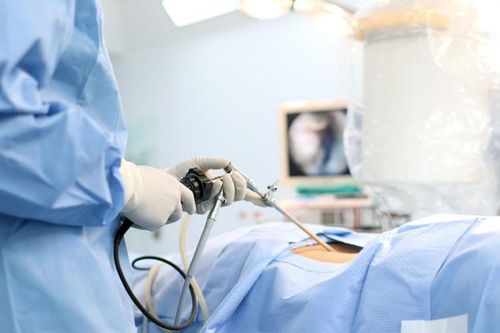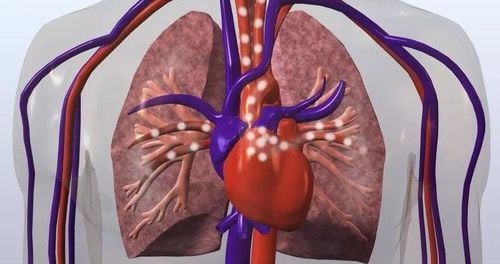This is an automatically translated article.
Lupus erythematosus is an autoimmune disease, for some reason the body's immune system attacks its own parts. This is a disease that can affect any part of the patient's body such as the heart, lungs, skin or eyes...
1. Effects of lupus on the heart and lungs
Lupus erythematosus increases the chance of heart disease and stroke. This may be due to the long-term inflammation that accompanies lupus. Certain medications used to treat lupus erythematosus, such as steroids, can also increase your risk of heart disease. Lupus erythematosus can cause inflammation of the myocardium or pericarditis. Patients may experience sharp pain in the chest caused by this condition.
Lupus erythematosus can also cause pleurisy, when the patient will feel pain in the chest area, which increases with deep breathing. Sometimes it leaves a scar in the lungs due to inflammation and makes it difficult for the patient to breathe.
Patients with lupus erythematosus can do some of the following to reduce the effects of the disease on the heart and lungs, including:
Avoid smoking: Smoking increases the likelihood of lung infections and heart disease. Tobacco also slows blood flow and raises your blood pressure. Exercise regularly: This makes your heart and lungs stronger. You can choose exercises such as walking, swimming, aerobics, yoga, Pilates,.... Eat healthy: A healthy diet helps to keep weight, blood pressure and cholesterol in control. Increase the use of fruits, vegetables and whole grains in the diet. Eat fish twice a week, especially salmon. Fish is rich in heart-healthy omega-3s. Fast food and fried foods should be avoided. Get flu and pneumonia vaccines.

Tiêm phòng để giảm ảnh hưởng của lupus đến tim và phổi
2. Effects of lupus on the skin
The skin of patients with lupus erythematosus can become sensitive to the ultraviolet (UV) rays of the sun. This can cause many changes in the skin. A common skin problem is a butterfly-shaped rash on the nose and cheeks. Red, scaly patches of skin can develop on the body of patients with lupus erythematosus. Coin-like patches of skin may appear on a person's body or scalp.
Patients with lupus erythematosus may also experience skin problems in other areas of the body such as:
Mouth or nose ulcers. Hair loss but not baldness. Fingers or toes that are white or blue when exposed to cold, this is Raynaud's phenomenon. Patients with lupus erythematosus can use the following measures to reduce the effects of the disease on the skin, including:
Protect skin from the sun: by using a sunscreen with SPF from 50 or more when outside and out of the midday sun. Wear a wide-brimmed hat and sun-protective clothing in the sun. Use the right shampoo and conditioner, avoiding harmful chemicals on the hair. Wear gloves and socks when it's cold: Raynaud's phenomenon usually occurs when it's cold. Therefore, patients with lupus erythematosus need to keep their limbs warm.
3. Effects of lupus on the kidneys
Lupus erythematosus can cause inflammation of the kidneys, causing permanent damage to the kidneys. Damage to the kidneys can lead to symptoms such as leg swelling and high blood pressure. In addition, the urine of patients with kidney damage may contain protein or blood cells. Even lupus can lead to kidney failure and in that case the patient needs dialysis.
Patients need to do the following to reduce the effects of lupus on the kidneys, including:
Talk to your doctor: when you have signs of kidney problems such as swelling in your ankles or legs, or blood in the urine. Perform periodic physical examination: Patients with lupus erythematosus need to have regular check-ups according to the doctor's appointment to be checked to make sure the kidneys are still working properly.

Bệnh nhân lupus nên khám định kỳ để được kiểm tra đảm bảo sức khỏe của thận
4. Effects of lupus on the eyes
Patients with lupus erythematosus may experience eye problems such as a feeling of dry eyes or discomfort. Patients can use artificial tears to relieve dry eyes.
Rarely, changes in the blood vessels in the retina can impair the patient's vision. Lupus can damage the nerves that control the muscles that control eye movement.
5. Effects of lupus on the brain and central nervous system
Lupus can affect a patient's brain and spinal cord in a variety of ways. Patients may experience problems such as:
Excessive thinking, confusion or memory loss Headache Depression and anxiety Convulsions Stroke (rarely). Patients with lupus erythematosus can take the following steps to reduce the effects of lupus on the brain and central nervous system, including:
Stress reduction: Patients can reduce stress by practicing yoga, posture chi and muscle relaxation. Using reminders and memos: Mobile phones with software to support reminders, memos and other support tools can help patients remember and arrange work and activity schedules. Get help: SLE patients can build and join a support network to get help when needed. Patients may also consider cognitive therapy to address issues such as anxiety or depression.

Tập thể dục thường xuyên để giảm ảnh hưởng của lupus đến não và hệ thần kinh trung ương
6. Effects of lupus on joints and muscles
Joint pain, swelling, and stiffness are common in patients with lupus, especially in the hands, wrists, and feet. Joint swelling does not damage the patient's joints, but it can be painful for the patient.
Lupus can also affect the patient's muscles and make them weak.
Some measures to help patients reduce the effects of lupus on joints and muscles, including:
Use anti-inflammatory drugs such as Ibuprofen, Naproxen. Shower with warm water, and use an ice pack to relieve pain and stiffness. Avoid high-intensity exercises: when suffering from joint pain, patients need to avoid high-intensity exercises. However, try to maintain gentle activities such as walking or yoga. Lupus erythematosus can affect any organ or part of the body, with varying degrees of damage in each patient. Patients should talk to their doctor about ways to prevent and minimize these effects.
Vinmec International General Hospital with a system of modern facilities, medical equipment and a team of experts and doctors with many years of experience in medical examination and treatment, patients can rest assured to visit. examination and treatment at the Hospital.
To register for examination and treatment at Vinmec International General Hospital, you can contact Vinmec Health System nationwide, or register online HERE.
Reference source: webmd.com













